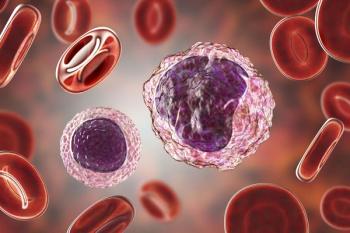
Bevacizumab-maly was approved by the FDA across numerous cancer indications, becoming the third FDA-approved bevacizumab biosimilar.

Your AI-Trained Oncology Knowledge Connection!


Hayley Virgil is a senior editor with CancerNetwork. When she isn't traveling to conferences and championing health equity in the oncology space, she can be found hiking, foraging wild plants, gardening, sewing ballgowns, practicing embroidery, or playing video games.

Bevacizumab-maly was approved by the FDA across numerous cancer indications, becoming the third FDA-approved bevacizumab biosimilar.

A unanimous vote cast by the FDA’s Oncologic Drugs Advisory Panel highlighted a need for randomized clinical trial data to support FDA approvals of PI3K inhibitors for patients with hematologic malignancies.

Patients with previously untreated IDH1-mutant acute myeloid leukemia experienced significant clinical benefit following treatment with ivosidenib and azacitidine compared with the placebo combination.

Patients with HER2-mutated metastatic non–small cell lung cancer who have previously received treatment with systemic therapies appear to benefit from treatment with fam-trastuzumab deruxtecan-nxki, which received priority review from the FDA.

Findings from a preplanned analysis assessing 2 clinical trials of bempegaldesleukin plus nivolumab in renal cell carcinoma and bladder cancer led to a decision to end the combination’s global clinical development program and discontinue all other ongoing clinical trials.

TG Therapeutics made the decision to voluntarily pull the biologics license application and supplemental new drug application for ublituximab/umbralisib in patients with chronic lymphocytic leukemia and small lymphocytic leukemia.

Patients with multiple myeloma and high-risk cytogenetics may benefit from treatment with high-dose therapy consolidation compared with delaying this approach.

European patients with locally advanced or metastatic urothelial cancer can now receive treatment with enfortumab vedotin following treatment with a platinum-containing regimen and a PD-(L)1 inhibitor.

In an interview with CancerNetwork®, Paul Barr, MD, discusses 8-year follow-up data from the phase 3 RESONATE-2 trial, assessing first-line ibrutinib in patients 65 years of age or older with chronic lymphocytic leukemia.

The FDA has lifted its partial clinical hold on magrolimab and azacitidine studies for patients with acute myeloid leukemia and myelodysplastic syndrome.

Patients with advanced solid tumors experienced an increase in dose-dependent T-cell proliferation following treatment with MEDI5752.

Patients with non–small cell lung cancer harboring a MET exon 14 skipping mutation appeared to derive durable efficacy following treatment with SCC244.

The European Commission approved lisocabtagene maraleucel for the treatment of certain patients with relapsed/refractory large B-cell lymphoma.

Serplulimab, which has been granted orphan drug designation by the FDA, is being considered as a treatment for patients with small cell lung cancer.

Although patients with endometrial cancer who had histologically confirmed endometriosis/adenomyosis achieved better overall survival than those without, the benefit was linked to stage, grade, age, and histological subtype.

Black patients were reported to be significantly less likely to receive standard of care surgical treatment for cancer of the gastrointestinal tract compared with White patients.

Patients with HER2-positive apocrine carcinoma of the breast are less likely to have an aggressive phenotype and are more likely to have favorable outcomes, even though the group has a lower rate of estrogen and progesterone receptor positivity.

The phase 1/2a TakeAim Leukemia trial assessing emavusertib alone or with azacitidine or venetoclax in relapsed/refractory acute myeloid leukemia or high-risk myelodysplastic syndrome has been placed on a partial clinical hold by the FDA.

In an interview with CancerNetwork®, Melissa Hardesty, MD, discusses how maintenance niraparib and bevacizumab following frontline platinum-based chemotherapy and bevacizumab yielded promising results in patients with advanced ovarian cancer.

Although tiragolumab plus atezolizumab and chemotherapy missed the primary end point of progression-free survival superiority in the phase 3 SKYSCRAPER-02 trial in patients with extensive-stage small cell lung cancer, it will continue to be evaluated in non–small cell lung cancer.

In an interview with CancerNetwork® during National Colorectal Cancer Awareness Month, Rachel Pearlman, MS, LGC, highlights recent updates in genetic testing in colorectal cancer and where the field needs to head to provide individuals with better options.

Patients with locally advanced cervical cancer did not see further benefit from the addition of concurrent durvalumab to chemoradiotherapy.

A biologics license application for sintilimab plus chemotherapy in first-line nonsquamous non–small cell lung cancer was not approved by the FDA and a complete response letter was issued to the drug developer.

Findings from a meta-analysis indicated that pathologic complete response is a notable predictor of outcomes in HER2-positive breast cancer.

Survival among patients with multiple myeloma appears to be influenced by factors such as socioeconomic status and treatment facility type.

Maurie Markman, MD, sits down with CancerNetwork® to discuss proposed legislation that would put a time limit on how long drugs with an accelerated approval can stay on the market, and how that may negatively impact patients with cancer.

Patients with mantle cell lymphoma appeared to benefit from brexucabtagene autoleucel as salvage therapy in the real-world setting.

A survival benefit was observed in patients with advanced or recurrent endometrial cancer who were treated with maintenance selinexor.

Patients with pretreated ovarian cancer who are resistant to platinum-based chemotherapy may experience promising responses and disease control following treatment with nemvaleukin alfa and pembrolizumab.

No differences in overall and progression-free survival were observed at the GOG-0252 trial update among patients with ovarian cancer who were treated with intravenous or intraperitoneal chemotherapy plus bevacizumab.